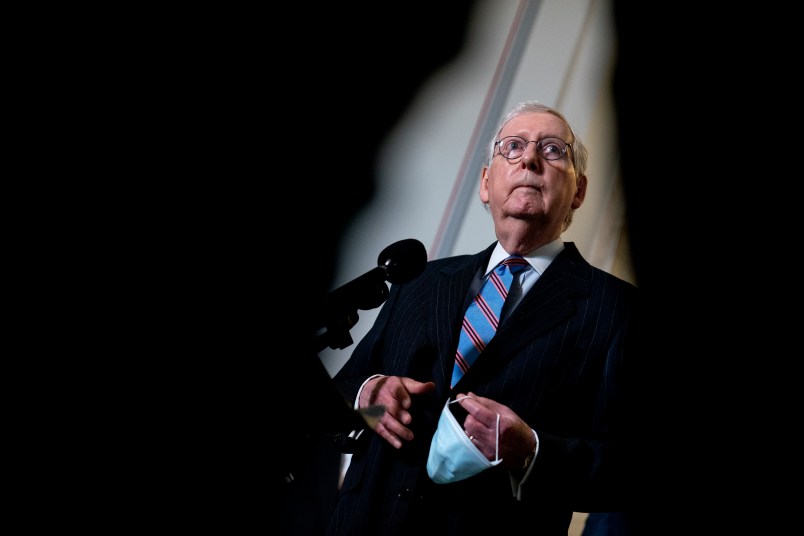Democrats have put together a multi-trillion dollar, expansive legislative package and are pushing hard for it — touting it at press conferences and in releases, walloping Republicans for standing in its way.
Republicans, meanwhile, are scrambling to offer up a counterproposal to blunt accusations that they’re obstructing for obstruction’s sake. That task is made immeasurably harder by statements their members have already made on the record, making their knee-jerk, comprehensive opposition to the Democratic plan well-known.
It’s a hot and sticky July in 2020.
By then, Democrats had long-since passed their COVID-19 relief plan, the $3 trillion HEROES Act, through the House. It was dead on arrival in the Republican-majority Senate, and Democrats eagerly pointed to that dynamic as evidence of the party’s unwillingness to help Americans out while the pandemic ravaged and economy teetered.
Republicans hastened to stitch together an answer, finally landing on the HEALS Act 10 weeks after the House passed HEROES. It was much smaller, and Senate Republicans presented it in an oddly splintered way, with different committees and members offering up different pieces.
Then-Senate Minority Leader Chuck Schumer (D-NY) mocked the piecemeal rollout as “a metaphor for their first 100 days: lack of unity. They can’t even put one bill together — they are so divided.”
While then-Senate Majority Leader Mitch McConnell (R-KY) tried to use the legislation to accuse Democrats of being the true obstructionists, he could never even bring it to a floor vote due to the lack of support from his own caucus. Many members had declared themselves opposed to any further stimulus funding at all, making it clear that the effort was more PR than earnest legislating.
The same now-familiar dynamics have emerged now as Democrats prepare to shepherd the infrastructure and jobs package through Congress. Republicans have not been coy in their opposition, with the Senate caucus circulating an internal memo calling it a “partisan, job-killing slush fund.”
Still, they’re trying to cobble together a counter-proposal, an attempt to at least look like the opposition is grounded in more than pure partisanship. The effort seems about as substantial as the HEALS lift, with Sen. Shelley Moore Capito (R-WV), one of the lead Republicans on the push, calling it a “conceptual Republican bill” and struggling to even settle on a topline figure the caucus will support.
The ‘Conceptual Republican Bill’
There are almost no public details about the Republican counter-offer because there seem to be almost no private ones. After telling reporters Wednesday that a $600 billion to $800 billion package would be the “sweet spot,” Capito rapidly backpedaled on Thursday, saying it’s “too early to say.” Her squirrelliness makes sense given other Republican comments — Sen. Mitt Romney (R-UT), one of the Republicans on the inside of the effort, called that price range “a little high.”
Other Republican members have indicated that the plan may include more money for roads and bridges than the Democratic one, and pay for itself by taxing the people who use the infrastructure instead of corporations — ironically shifting the onus from “coastal elites” to much of their own rural constituency.
Can’t Pay For It, Can’t Not Pay For It
But all of that is undergirded by the molten core of GOP intransigence. The party’s senators have already eliminated virtually any path to paying for an infrastructure plan by gouging a deep line in the sand: “I don’t think there’s going to be any enthusiasm on our side for a tax increase,” McConnell said.
Republicans have also staked out their opposition to deficit spending with a flat refusal to let infrastructure add to the national debt.
Meanwhile, the potential taxes the Republicans working on the counter-legislation propose — that the people using the infrastructure pay for it — seem to be studded with landmines for Democrats even if McConnell got over his opposition to any and all taxation. The internal GOP Senate caucus memo explicitly included polling showing Americans disfavoring any personal tax hike and a gas tax in particular — a talking point on its way to being an attack ad, should Democrats embrace the pay-for.
Negotiating In Bad Faith
Meanwhile, their reputation as good-faith negotiating partners has been pretty dinged up by their own public stance against the Democrats’ package. Even if Democrats tried to look past the last 10 years of fairly constant GOP obstruction to their every legislative push, Republicans have made little effort to promote themselves as malleable in this once-bipartisan issue area.
They’ve lambasted the package as stuffed with measures that aren’t “real infrastructure,” paring the word down to solely describe roads and bridges, excluding even such things as water pipes. Sen. Marsha Blackburn (R-TN) has been thoroughly mocked on Twitter for announcing, with much indignation, that Democrats are trying to include such non-infrastructure measures in the package as… elder care.
Some Republican members clamor to want bipartisan input, an assertion undermined by their leadership’s eager excoriating of the Democratic plan every time they talk about it.
“That package that they’re putting together now, as much as we would like to address infrastructure, is not going to get support from our side,” McConnell said earlier this month at a news conference in Kentucky.
“I’m going to fight them every step of the way, because I think this is the wrong prescription for America,” he added.







WOW, conceptually there is NO Republican Bill
The entire Republican Party Policy so long as a Democrat is president comes down to one word, OPPOSE.
Because Republicans are so bad at governing, the only way back into power is to stop the Democrats from doing anything.
I have a Conceptual Republican Bill that one day will not only have full architectural renderings, but actual, possibly even functional, prototypes!
Actually, their word is OPPOSE regardless of who is in power, Democrat or Republican. Either obstruct completely or find ways to try to derail anything proposed by Democrats.